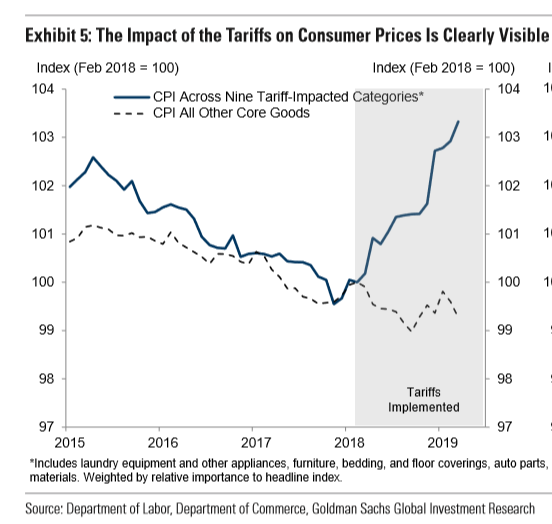
On Tuesday, Jonathan Swan of Axios reported that senior officials within the Trump administration have told him that they see no end in sight for the president's trade war with China. According to one official, "the differences between the two sides are so profound" that there likely won't be a resolution until next year.
You read that right: next year.
This is absolutely terrible news for multiple U.S. industries, especially the farming sector which has been hardest hit by the trade war. Closed off export markets have cost U.S. farmers (and U.S. taxpayers tapped to bail out the losses) billions.
Thus far, Trump's rosy assurances of a favorable trade deal have proven fruitless, with his recent escalation of tariffs on $200 billion of Chinese goods last week being met with the Chinese government increasing the tariff rate on $60 billion of U.S. goods. More pain, no gain.
With family-farm bankruptcies on the rise, farmers are understandably distressed.
"The President of the United States owes farmers like myself some type of plan of action," a soybean farmer in Virginia told CNN on Monday. "Farmers were his base. They helped elect this president ... and now he's turning his back on America's farmers when we need him the most."
U.S. soybean farmers have been dealing with the devastating effects of retaliatory tariffs from China for almost a year, and a poor crop is making matters worse.
"The economic consequences of this trade war are real," an Illinois hog farmer told Fox News last week. He has seen a six-figure loss on the value of his hogs thanks to Trump's trade policy.
A representative from JP Morgan said on Tuesday, in conjunction with a downgrade of John Deere's stock, that the state of U.S. agriculture is "rapidly deteriorating," and that the situation is a "perfect storm for U.S. farmers."
Meanwhile, American consumers are also being pinched. The prices of goods from affected industries have risen sharply (well beyond the inflation rate), as a newly released chart from Goldman Sachs pretty clearly demonstrates:
Without a deescalation of the trade war, or some kind of trade deal, consumer prices will only continue to rise.
On Tuesday, President Trump tweeted that the U.S. farmers suffering from his trade policies are patriots, and that they will eventually be rewarded for their sacrifices — or at least be compensated for their losses by U.S. taxpayers.
....This money will come from the massive Tariffs being paid to the United States for allowing China, and others, to do business with us. The Farmers have been “forgotten” for many years. Their time is now!
— Donald J. Trump (@realDonaldTrump) May 14, 2019
Of course, the president framed things differently. He continues to push the narrative that the revenue our federal government brings in from tariffs is paid by other countries (like China). This, however, is a lie — one the president repeats often. The tariffs are being paid by U.S. importers and passed down to the consumer. Tariffs are taxes, and Americans are flipping the bill. Even Trump's chief economic advisor Larry Kudlow admits this.
Those who follow fiscal conservatives on Twitter know this to be a regular gripe:



Notably, that last tweet was from Republican congressman Justin Amash, one of the few remaining GOPers in Washington who isn't afraid to publicly speak out against Trump's trade debacle. Most D.C. Republicans — after many initially voiced opposition to the president's trade policy — have pretty much fallen silent in their dissent.
Why? It's a good question considering that Republican politicians have traditionally defended the free market and opposed government bailouts. You'd think they'd have a hard time sitting on the sidelines and watching American producers and consumers suffer from a very costly, self-defeating trade policy that violates their long preached principles and policy positions.
But sitting on the sidelines is exactly what they're doing, in large part because the Republican base insists that their representatives pledge allegiance to Trump, and support pretty much whatever the president wants.
This lockstep creed has become an enormous part of the modern GOP's identity, taking precedence over the basic tenets of conservatism that used to define the party. Trump expects and demands loyalty ("fealty" is probably a better word for it), and the base has been conditioned (with the help of cable news and talk radio) to expect and demand it of their reps — even when it means siding with the likes of Bernie Sanders, Elizabeth Warren, and Chuck Schumer:

Even many of the farmers — whose livelihoods are in jeopardy because of Trump's policies — subscribe to the loyalty doctrine, which puts an exclamation point on the political complexities faced by Republican lawmakers.
This is dangerous — not only because unconditional loyalty to a politician is unhealthy in a free society, but because members of the U.S. Congress have it within their power to amend or repeal a small number of Constitutional statues that would put trade-related decisions back in their hands. They could end this trade war rather quickly, but Republicans won't even try to, because it would be seen as an act of disloyalty to Trump. And such a thing would be remembered when it comes time for constituents to vote in the next primary.
This is especially silly, considering that Trump would likely benefit politically from Congress taking the reins on trade. Ending the trade war would build back strength in a key economic sector as we head into an election season in which Trump has an otherwise strong U.S. economy to his advantage. The president would be saved from his own bad policy while landing in a position to blame the establishment for his inability to negotiate the kind of deal he promised to deliver.
But it won't happen. Trump began this ill-advised venture unilaterally, and he'll have to end it unilaterally.
Here's where the president is right, in regard to the trade war: It does hurt China. It hurts China economically and does so more than it hurts the United States (statistically, anyway). Simple logic would suggest that this would give us enough leverage to get what we want out of trade negotiations.
But there's nothing simple about this situation, and there's a key component (among several others) that Trump clearly missed when he based his trade policy off of the premise that trade wars are "are good, and easy to win..."
China operates under a very different system of government than we do. China is not a democracy. It's ruled by an oppressive regime that is perfectly at ease with letting its citizens suffer through a long economic conflict with a foreign rival like the United States, if it's in the regime's best interest.
This gives China a big advantage over the United States, where free elections compel elected representatives to be far more responsive to the citizenry. It doesn't always feel that way, but it's true. As loyal as a lot of Americans are to President Trump, those individuals make up a clear minority of the electorate, and they do have limits on what they're willing to tolerate and sacrifice — especially when their very way of life is on the line.
Eventually, Trump will have to cave in one form or another, and Americans will then have to decide if any of this undertaking was worth the the steep costs it has incurred. The safe bet is no.
In the meantime, the political cowardliness will continue, as will the domestic pain.












